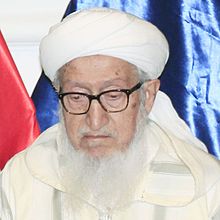



Sufism is considered as an essential aspect of Islam in Afghanistan.[1] Most people are not followers of Sufism[2] but Sufis have a considerable influence on both urban and rural society.[1][3] Sufism has been part of the country for as long as 1300 years, so Afghanistan is recognised as the "Home of Sufi Saints".[1] Sufism was suppressed by the Taliban when they governed from 1996 to 2001, after which it was regaining its importance.[1]
Sufism has shaped Afghan society and politics for much of the country's history. Today, very few are aware of this legacy. Might the Sufis now provide an important contribution to the stability of the country?
— Marian Brehmer, 2015[4]
- ^ a b c d Azami, Dawood (2011-02-23). "Sufism returns to Afghanistan after years of repression". BBC News. Retrieved 2020-06-26.
- ^ "Will The Taliban Listen To Afghanistan's Sufis?". RadioFreeEurope/RadioLiberty. Retrieved 2020-06-27.
- ^ "Afghanistan - Sufis". Country Studies. Retrieved 2020-06-26.
- ^ Cite error: The named reference
Brehmerwas invoked but never defined (see the help page).